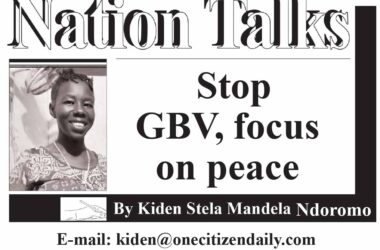By Gama Hassan Oscas
In the turbulent landscape of South Sudan, the question of who holds the authority to announce the conduct of elections has ignited a fierce debate.
On one side, we have the ruling party, vociferously proclaiming that elections are an absolute must come December 2024, while the electoral body remains conspicuously silent.
This divergence of opinions brings to the forefront a critical issue that strikes at the heart of democracy and governance – the separation of powers and the fundamental responsibility of organizing elections.
This opinion piece embarks on the analysis of the question of who has the powers, between the electoral body and the ruling party in South Sudan regarding the announcement of elections. We will delve into international and regional standards and practices, along with relevant laws related to elections, to shed light on this contentious issue.
Furthermore, we will scrutinize the prevailing conditions in South Sudan, which cast serious doubts on the feasibility of holding credible elections. The absence of electoral laws, a permanent constitution, a unified national army, the repatriation of refugees and internally displaced persons (IDPs), and the lack of democratic space are just a few of the myriad challenges that jeopardize the prospects of free and fair elections.
At the core of this dispute lies the fundamental question of who possesses the legitimate authority to announce elections. In democratic societies, it is widely accepted that electoral bodies are entrusted with this responsibility.
This mandate is grounded in principles of fairness, impartiality, and the rule of law. In South Sudan, the electoral body is no exception and is vested with the authority to conduct and oversee elections, as stipulated in the Elections Act.
To appreciate the gravity of this matter, it is imperative to examine international and regional standards regarding electoral processes. These standards provide essential guidance and set the stage for the electoral framework in any democratic nation.
The African Union (AU) and the United Nations (UN) have both emphasized the importance of credible elections as a cornerstone of democratic governance. According to the African Charter on Democracy, Elections, and Governance, which South Sudan is a signatory to, elections must be conducted “under conditions of equality, transparency, and fairness.”
Furthermore, the UN’s Universal Declaration on Democracy underscores the significance of periodic and genuine elections as a fundamental component of democracy.
In the face of these international norms, the stance taken by the ruling party in South Sudan raises red flags. Their insistence on elections without addressing the substantial deficiencies in the electoral process, as well as the broader political and security context, raises questions about their commitment to democratic principles.
A closer examination of the South Sudanese political landscape reveals a host of challenges that undermine the feasibility of holding credible elections. These challenges not only threaten the integrity of the electoral process but also the stability and future of the nation.
South Sudan currently lacks a comprehensive set of electoral laws. These laws are essential for outlining the rules and regulations governing elections, ensuring transparency, and protecting the rights of all political actors. Without such legal frameworks, the electoral process remains vulnerable to manipulation and disputes.
The absence of a permanent constitution in South Sudan is a significant impediment to the establishment of a clear and stable legal and political framework. A constitution provides the fundamental principles upon which a nation is built and is crucial for the conduct of elections within a democratic framework.
South Sudan continues to grapple with security challenges, including sporadic outbreaks of violence and a fragmented security apparatus. The existence of these security concerns creates a hostile environment for political parties to freely engage in campaigning and for citizens to exercise their right to vote without fear of intimidation.
The repatriation of refugees and internally displaced persons (IDPs) remains an unresolved issue. Ensuring their participation in the electoral process is essential to upholding the principles of inclusivity and representation. However, without a comprehensive plan for their return and integration, their voting rights are compromised.
One of the cornerstones of any democratic society is the existence of a vibrant and pluralistic political landscape. In South Sudan, the lack of democratic space stifles the ability of opposition parties to compete on an equal footing. Reports of harassment, restrictions on political activities, and violence against political opponents further erode confidence in the electoral process.
South Sudan has been marred by years of conflict, and the implementation of peace agreements remains incomplete. The very actors who have failed to fully implement the revitalized peace agreement are now championing elections. This raises questions about the sincerity of their commitment to peace and stability.
The ruling party’s insistence on holding elections despite these glaring challenges is not without controversy. While the democratic process should ideally include elections at regular intervals, it is equally essential that these elections meet international standards of fairness and transparency.
The ruling party’s eagerness to proceed with elections, even in the face of overwhelming obstacles, begs the question of whether their motivations are driven by genuine democratic aspirations or a desire to consolidate power.
In many democratic societies, it is expected that the ruling party demonstrates a commitment to democratic values and principles. This includes fostering an environment conducive to free and fair elections, addressing issues of governance, and working collaboratively with opposition parties to create the conditions necessary for credible electoral processes.
In any democratic society, the voice of the people is paramount. The South Sudanese people’s views on the timing and feasibility of elections are crucial in this context. Their perspectives should be heard and respected in the decision-making process.
It is worth noting that a rush to hold elections in the midst of unresolved challenges could lead to a situation where a significant portion of the population is unable to participate effectively. This could undermine the legitimacy of the electoral outcome and exacerbate existing tensions.
The question on who has the mandate, between the electoral body and the ruling party in South Sudan over the announcement of elections underscores the fundamental importance of upholding democratic principles and the rule of law. While elections are a crucial component of any democracy, they must be conducted under conditions that ensure fairness, transparency, and inclusivity.
International and regional standards emphasize the significance of credible elections as a cornerstone of democratic governance. South Sudan’s commitment to these standards is essential not only for the nation’s democratic development but also for its stability and prosperity.
The challenges facing South Sudan, including the absence of electoral laws, a permanent constitution, unresolved security concerns, and a lack of democratic space, cannot be ignored. These issues must be addressed comprehensively before proceeding with elections to avoid the risk of further instability and potential electoral disputes.
Ultimately, the decision on when and how to announce elections should be guided by a commitment to the principles of democracy, the rule of law, and the best interests of the South Sudanese people. Only by addressing the underlying challenges and working collaboratively can South Sudan hope to achieve the credible and peaceful elections that its citizens deserve.
It is imperative that all stakeholders in South Sudan, including the ruling party, opposition parties, civil society, and the international community, engage in constructive dialogue to find a way forward that respects democratic values and ensures a peaceful and stable future for the nation.
In the absence of such a collective effort, the prospects for genuine democracy in South Sudan remain uncertain, and the people of South Sudan will continue to bear the brunt of political instability and insecurity.
The author of this opinion piece is an advocate and can be reached on email at: oscarsgama@gmail.com




